Created by William Huang & Savita Maharaj
Introduction
The slave narrative was a large part of the abolitionist movement in the 19th century. These narratives were authored by both enslaved and free Black men and women as a means of empowerment which worked to combat white oppression through the virtue of Black literature. This sought to challenge the dehumanization of Black people by white slave owners. The rhetoric used in slave narratives was heavily influenced by the status of their respective authors as shown by Chloe Russell and David Walker's vastly different rhetoric on domesticity and marriage.
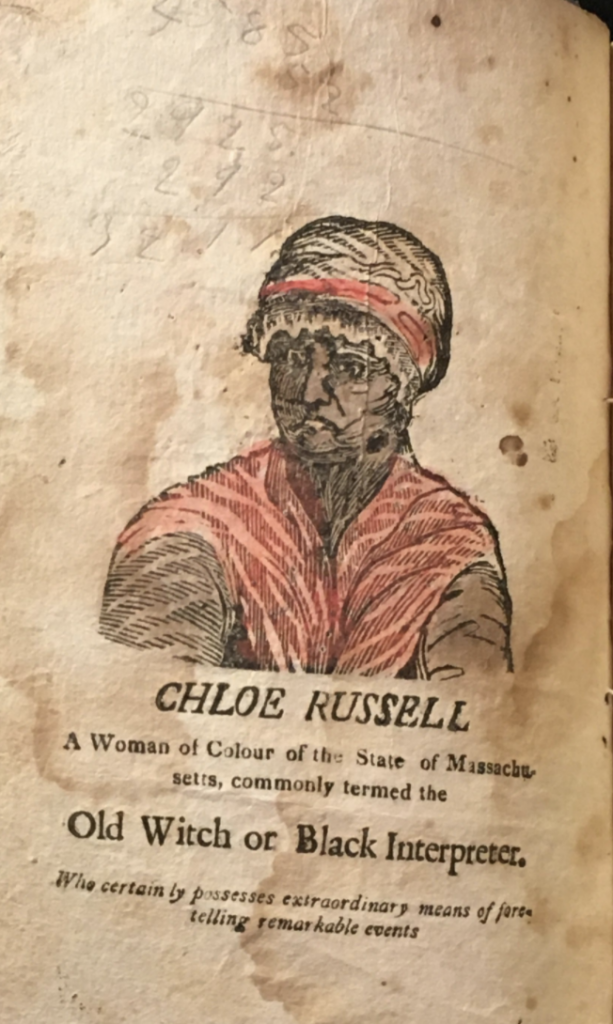
Russell, Chloe, The Complete Fortune Teller, and Dream Book, 1824, Boston Athenaeum. Book.
Chloe Russell
Chloe Russell’s identity remains in question to this day. Eric Gardner’ was able to determine that a Black woman named Chloe Russell existed during The Complete Fortune Teller and Dream Book’s publication in the 1820s.1 Gardner raises the possibility of the name being an invention or appropriated name “by a publisher hoping to capitalize on the stereotype of the African American fortune teller.”2 Regardless, Gardner notes the existence of records dating between 1831-33 of a “free person of color” by the name of Chloe Russell whose timeline can be traced in historical directories. Russell was a widowed woman supporting a family of at least three children, which relates to her book’s emphasis on marriage and domesticity.

Russell, Chloe, The Complete Fortune Teller, and Dream Book, 1824, Boston Athenaeum. Book.
David Walker
David Walker (1785-1830) was among the most known of the African American authors protesting for Black rights during the 19th century. His militant approach to anti-slavery in his Appeal in Four Articles; Together with a Preamble, to the Coloured Citizens of the World marked him as one of the most outspoken advocates of violent movement. Walker, born to an enslaved father and free mother, was a free Black man yet witnessed first-hand the “peculiar institution” of slavery in the and injustice of Black people while growing up in the cities of Wilmington and Charleston in South Carolina. Walker lived in Boston from 1825 onwards and was inducted into the first Black masonic lodge in North America. Walker’s appeal, published during the years 1829-30, was greatly influenced by his involvement with Christianity, making use of religion to call for racial justice.
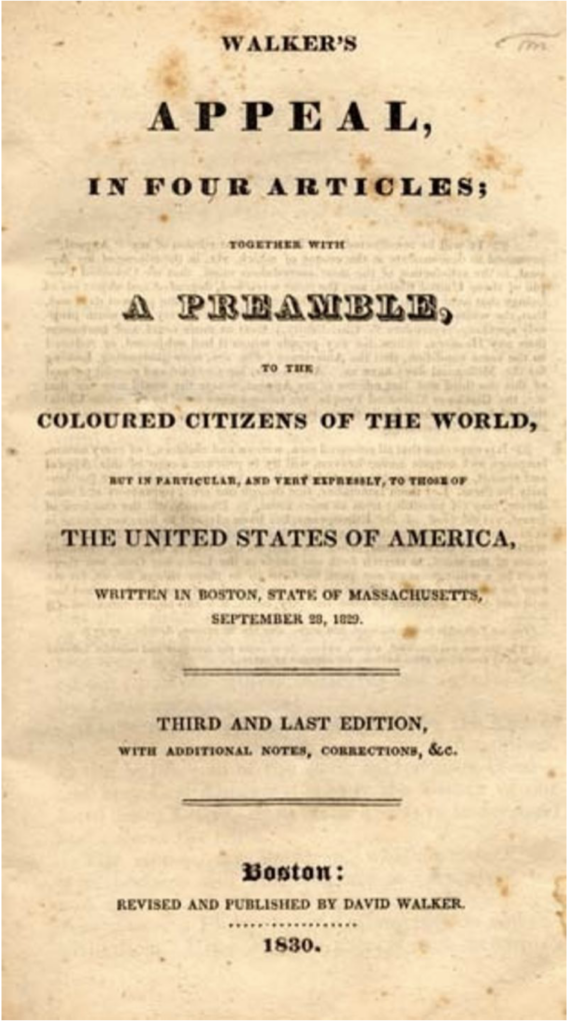
Caption: Walker, David, Walker’s Appeal, in Four Articles; Together with a Preamble, to the Coloured Citizens of the World, but in Particular, and Very Expressly, to Those of the United States of America, Written in Boston, State of Massachusetts, September 28, 1829, 1829.
Rhetoric of Marriage and Domesticity in the Form of Prophecy
“Thus, the patriarchal institution of marriage was not considered any different than the institution of slavery.”3
Most Black households lived in poverty, with few women having the fortune of marrying into economic stability.4 Chloe Russell uses The Complete Fortune Teller and Dream Book to provide an authoritative female voice choosing to adapt to feminine ideals as opposed to defying it like women such as Maria Stewart. Her writing gives Black women advice for an ideal partner in the form of prophecy and fortune-telling, appealing towards a Black female readership. The invoking of African mysticism gives Russell the role of a matchmaker and strengthens her authority over the reader through her text.
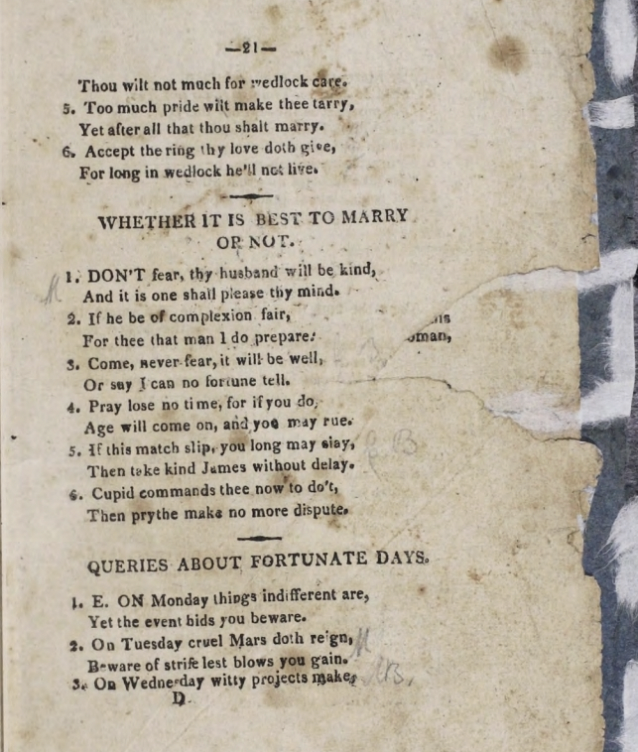
Russell, Chloe, The Complete Fortune Teller, and Dream Book, 1824, Boston Athenaeum. Book.
Russell’s poems and rhetoric heavily emphasize marriage and domesticity, portraying these ideals for a Black woman to aspire to. Her poem, “Whether it is best to marry or not'', encourages women to seek the marriage to find a white partner: “If he be of complexion fair, / For thee that man I do prepare.”5 Compared to David Walker’s vocal support of Black identity, Russell embraces her own lowness, describing herself as a “poor, unfortunate Female African.”6
"Of Moles"
“Of Moles'' is one of Chloe Russell’s many poems within her novel. The focus on ‘moles’ or beauty marks as a means of divination is unfamiliar to American women. Notably, the poem is aimed towards men as well shown from the line: “A mole on either ancle, denotes a man to be effeminate; a woman courageous,”suggesting that women were not only advised to recognize their own fortune but also find the same in their partner.7
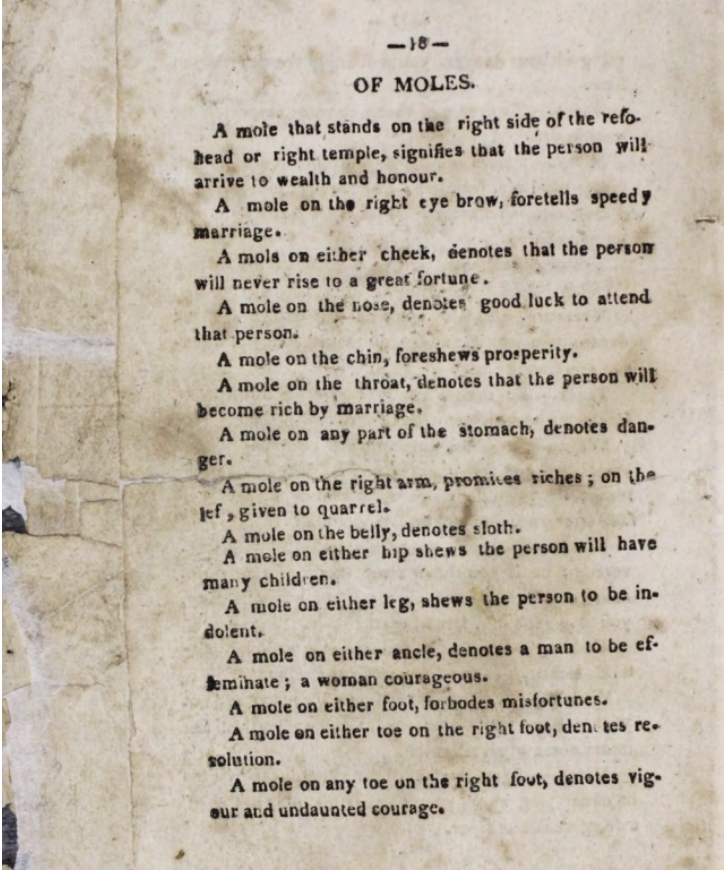
Russell, Chloe, The Complete Fortune Teller, and Dream Book, 1824, Boston Athenaeum. Book.
The use of ‘moles’ on different body parts as a form of symbolism for fortune is written as a form of ‘guidebook’.
From David Walker’s Appeal in Four Articles; Together with a Preamble, to the Coloured Citizens of the World
“My dearly beloved Brethren and Fellow Citizens.”8
David Walker’s slave narrative portrays him as an abolitionist whose critical of the racial injustice of 19th century America. Walker greatly opposes all aspects of the American social system, including marriage. Walker expresses his authority through his precise use of rhetoric. His aggressive language and style of punctuation intensifies the heated emotion of his writing, expressing his anger at the injustice he perceives towards his people. Marcy J. Dinius draws attention to the typography of the appeal, emphasizing seemingly minor aspects such as the heavy exclamation used for emphasis, a visual which draws attention to specific forms of injustice, and as a form of victory on the written page:
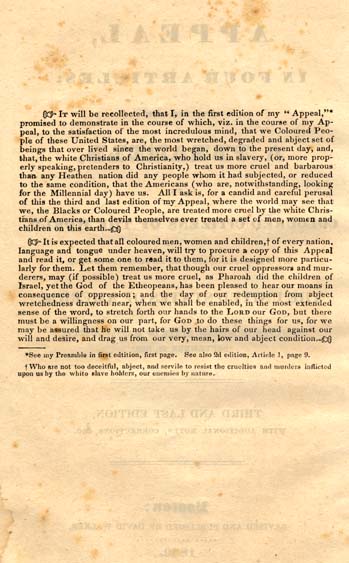
Caption: Walker, David, Walker’s Appeal, in Four Articles; Together with a Preamble, to the Coloured Citizens of the World, but in Particular, and Very Expressly, to Those of the United States of America, Written in Boston, State of Massachusetts, September 28, 1829, 1829.
Typically, the text helps its readers to understand this incredible discrepancy with their own eyes, commanding them to [l]ook!! look!!! at this!!!!”- at the “15000 white” versus “Three Hundred and Thirty-five Thousand coloured people.” Walker’s appeal was likely controversial in its time, owing to its rhetoric of dehumanizing whites in return to how he claims Black people to be dehumanized as ‘brutes’ themselves.
“Do they not institute laws to prohibit us from marrying among the whites? I would wish, candidly, however, before the Lord, to be understood, that I would not give a pinch of snuff to be married to any white person I ever saw in all the days of my life. And I do say it, that the Black man, or man of colour, who will leave his own colour (provided he can get one, who is good for any thing) and marry a white woman, to be a double slave to her, just because she is white, ought to be treated by her as he surely will be, viz: as a N*****!!!!”9
David Walker’s views on marriage stand opposed to Russell’s, deeming marriage between a man of colour as a form of slavery on its own. Walker’s rhetoric of marriage serves as a form of comparison to express the status of Black Americans as unjustly beneath white Americans.
Conclusion
Both the narratives of Chloe Russell and David Walker serve as a form of empowerment and an escape from oppression. . Russell, however, remains within the domestic role yet manages to provide women with the ability to ‘choose’ as a form of autonomy, while Walker’s disappointment with American society leads to a more overt call to arms against oppression.
Endnotes
1 " Gardner, Eric. “‘The Complete Fortune Teller and Dream Book:’ An Antebellum Text ‘By Chloe Russel, a Woman of Colour.’” (The New England Quarterly, Vol. 78, No. 2, 2005), 259
2 Gardner, Eric. “‘The Complete Fortune Teller and Dream Book:’ An Antebellum Text ‘By Chloe Russel, a Woman of Colour.’” (The New England Quarterly, Vol. 78, No. 2, 2005), 264-265
3 Peksen, Seda. “An analysis of the power relations between white and black women in the slave narratives/Kole anlatılarında beyaz ve zenci kadinlar arasindaki guc iliskileri.” (Interactions, 2013)
4 King, Wilma. Essence of Liberty: Free Black Women During the Slave Era, (University of Missouri Press, 2006) 60
5 Walker, David. “From David Walker’s Appeal in Four articles, Together with a Preamble, to the Coloured Citizens of the World”. (The Norton Anthology of African American Literature, 2014) 161
6 Gardner, Eric. “‘The Complete Fortune Teller and Dream Book:’ An Antebellum Text ‘By Chloe Russel, a Woman of Colour.’” (The New England Quarterly, Vol. 78, No. 2, 2005), 269
7 Gardner, Eric. “‘The Complete Fortune Teller and Dream Book:’ An Antebellum Text ‘By Chloe Russel, a Woman of Colour.’” (The New England Quarterly, Vol. 78, No. 2, 2005), 286
8 Walker, David. “From David Walker’s Appeal in Four articles, Together with a Preamble, to the Coloured Citizens of the World”. (The Norton Anthology of African American Literature, 2014) 161
9 Walker, David. “From David Walker’s Appeal in Four articles, Together with a Preamble, to the Coloured Citizens of the World”. (The Norton Anthology of African American Literature, 2014) 165
Bibliography
Dinius, Marcy J. ““Look!! Look!!! at This!!!!”: The Radical Typography of David Walker’s Appeal.” PMLA : Publications of the Modern Language Association of America 126.1 (2011): 55-72. Web. https://www-jstor-org.ezproxy.neu.edu/stable/41414081.
Gardner, Eric. “‘The Complete Fortune Teller and Dream Book’: An Antebellum Text ‘By Chloe Russel, a Woman of Colour.’” The New England Quarterly, vol. 78, no. 2, 2005, pp. 259–288. JSTOR, https://www.ezproxy.neu.edu.jstor.org/stable/30045526.
King, Wilma. Essence of Liberty : Free Black Women During the Slave Era, University of Missouri Press, 2006. ProQuest Ebook Central, https://ebookcentral.proquest.com/lib/northeastern-ebooks/detail.action?docID=3570895.
Peksen, Seda. “An analysis of the power relations between white and black women in the slave narratives/Kole anlatilarinda beyaz ve zenci kadinlar arasindaki guc iliskileri.” Interactions, vol. 22, no. 1-2, 2013, p. 119+. Gale Academic OneFile, link.gale.com/apps/doc/A328943984/AONE?u=mlin_b_northest&sid=AONE&xid=efce5a8f.
Rascher, Stephen Robert. “The Neo-slave Narratives of Hurston, Walker, and Morrison: Rewriting the Black Woman’s Slave Narrative.” (1998). Web. https://link.ezproxy.neu.edu/login?url=https://www-proquest-com.ezproxy.neu.edu/dissertations-theses/neo-slave-narratives-hurston-walker-morrison/docview/304429630/se-2?accountid=12826.
Russell, Chloe, The Complete Fortune Teller, and Dream Book, 1824, Boston Athenaeum. Book
Walker, David. “From David Walker’s Appeal in Four articles, Together with a Preamble, to the Coloured Citizens of the World”. The Norton Anthology of African American Literature. Volume 1, 3rd ed, edited by Henry Louis Gates, Jr. et al, W.W. Norton & Company, 2014, pp. 160-171.
